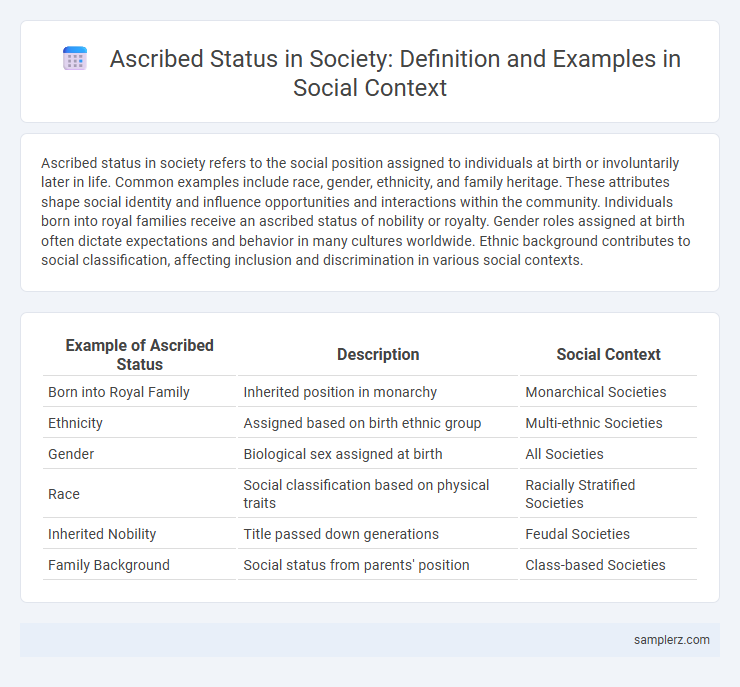Ascribed status in society refers to the social position assigned to individuals at birth or involuntarily later in life. Common examples include race, gender, ethnicity, and family heritage. These attributes shape social identity and influence opportunities and interactions within the community. Individuals born into royal families receive an ascribed status of nobility or royalty. Gender roles assigned at birth often dictate expectations and behavior in many cultures worldwide. Ethnic background contributes to social classification, affecting inclusion and discrimination in various social contexts.
Table of Comparison
| Example of Ascribed Status | Description | Social Context |
|---|---|---|
| Born into Royal Family | Inherited position in monarchy | Monarchical Societies |
| Ethnicity | Assigned based on birth ethnic group | Multi-ethnic Societies |
| Gender | Biological sex assigned at birth | All Societies |
| Race | Social classification based on physical traits | Racially Stratified Societies |
| Inherited Nobility | Title passed down generations | Feudal Societies |
| Family Background | Social status from parents' position | Class-based Societies |
Defining Ascribed Status in Social Structures
Ascribed status in social structures refers to the fixed social positions assigned at birth or involuntarily later in life, such as race, gender, ethnicity, and family heritage. These statuses shape individuals' roles and expectations without choice, influencing access to resources, social networks, and opportunities. Understanding ascribed status reveals how societal inequalities and social stratification are maintained across generations.
The Role of Family Background in Determining Status
Family background significantly influences ascribed status by shaping an individual's social identity from birth through inherited socioeconomic position, cultural capital, and lineage. Factors such as parental occupation, wealth, ethnicity, and social ties play crucial roles in defining social hierarchy and access to opportunities. This inherited status often affects educational attainment, social networks, and overall life chances, reinforcing societal stratification over generations.
Gender as an Example of Ascribed Social Position
Gender represents a fundamental example of ascribed status in society, assigned at birth based on biological characteristics and shaping individual identity and social roles. This ascribed social position influences access to resources, expectations, and interactions within communities, often affecting opportunities and treatment throughout life. Understanding gender as an ascribed status reveals its impact on social stratification and institutional structures across cultures.
Ethnicity and Race: Ascribed Identities in Society
Ethnicity and race serve as fundamental examples of ascribed status, shaping individuals' social identities from birth based on inherited cultural traits and physical characteristics. These identities influence social interactions, access to resources, and opportunities within various societal structures. Ethnic and racial ascriptions often reinforce systemic inequalities and contribute to the formation of group-based social hierarchies.
Caste Systems and Birth-Based Status Assignments
Ascribed status in society is exemplified by caste systems, where individuals inherit social positions based on birth, limiting mobility and defining social identity. In birth-based status assignments, factors such as family lineage, ethnicity, and social group determine access to privileges and resources irrespective of personal achievements. This rigid structure reinforces social stratification and perpetuates inequality across generations.
The Influence of Age on Social Hierarchies
Age significantly shapes social hierarchies by assigning individuals an ascribed status that influences their roles, privileges, and expectations within society. Older adults often hold positions of respect and authority, reflecting cultural values that associate age with wisdom and experience. In contrast, younger individuals may face limitations in social power and opportunities due to perceptions of inexperience and lower status.
Inherited Wealth and Social Class Distinctions
Inherited wealth serves as a prominent example of ascribed status, where individuals are born into financial privilege that shapes their social class distinctions. This inherited economic advantage often perpetuates social stratification, influencing access to education, career opportunities, and social networks. Consequently, ascribed status linked to family wealth reinforces societal inequalities and limits social mobility across generations.
Religion as an Ascribed Social Identity
Religion as an ascribed social identity often shapes individuals' roles and expectations from birth, influencing social interactions and community belonging. In many societies, religious affiliation is inherited and determines participation in rituals, moral obligations, and social networks without personal choice. This inherited religious status can impact access to resources, power, and social mobility within various cultural contexts.
Royalty and Nobility: Status by Birthright
Ascribed status in society is exemplified by royalty and nobility, where individuals inherit their social rank and privileges by birthright. Titles such as king, queen, duke, or duchess are predetermined and passed down through family lineage, establishing a fixed social hierarchy. This hereditary status influences access to power, wealth, and social influence without personal achievement.
Disability and Social Perceptions of Status
Disability often constitutes an ascribed status in society, influencing social perceptions and interactions independently of individual achievements. People with disabilities may face stereotypes and social exclusions that impact their access to education, employment, and social networks. These perceptions shape societal attitudes and reinforce structural inequalities, highlighting the importance of inclusive policies and awareness.

example of ascribed status in society Infographic
 samplerz.com
samplerz.com